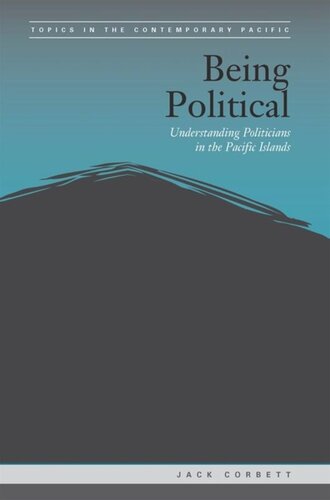

Most ebook files are in PDF format, so you can easily read them using various software such as Foxit Reader or directly on the Google Chrome browser.
Some ebook files are released by publishers in other formats such as .awz, .mobi, .epub, .fb2, etc. You may need to install specific software to read these formats on mobile/PC, such as Calibre.
Please read the tutorial at this link: https://ebookbell.com/faq
We offer FREE conversion to the popular formats you request; however, this may take some time. Therefore, right after payment, please email us, and we will try to provide the service as quickly as possible.
For some exceptional file formats or broken links (if any), please refrain from opening any disputes. Instead, email us first, and we will try to assist within a maximum of 6 hours.
EbookBell Team

4.0
66 reviewsPoliticians everywhere tend to attract cynicism and inspire disillusionment. They are supposed to epitomize the promise of democratic government and yet invariably find themselves cast as the enemy of every virtue that system seeks to uphold. In the Pacific, "politician" has become a byword for corruption, graft, and misconduct. This was not always the case—the independence generation is still remembered as strong leaders—but today's leaders are commonly associated with malaise and despair. Once heroes of self-determination, politicians are now the targets of donor attempts to institute "good governance," while Fiji's 2006 coup was partly justified on the grounds that they needed "cleaning up."
But who are these much-maligned figures? How did they come to arrive in politics? What is it like to be a politician? Why do they enter, stay, and leave? Drawing on more than 110 interviews and other published sources, including autobiographies and biographies, Being Political provides a collective portrait of the region's political elite. This is an insider account of political life in the Pacific as seen through the eyes of those who have done the job.
We learn that politics is a messy, unpredictable, and, at times, dirty business that nonetheless inspires service and sacrifice. We come to understand how being a politician has changed since independence and consider what this means for how we think about issues of corruption and misconduct. We find that politics is deeply embedded in the lives of individuals, families, and communities; an account that belies the common characterization of democracy in the Pacific as a "façade" or "foreign flower."
Ultimately, this is a sympathetic counter-narrative to the populist critique. We come to know politicians as people with hopes and fears, pains and pleasures, vices and virtues. A reminder that politicians are human—neither saints nor sinners—is timely given the wave of cynicism and disaffection. As such, this book is a must read for all those who believe in the promise of representative government.